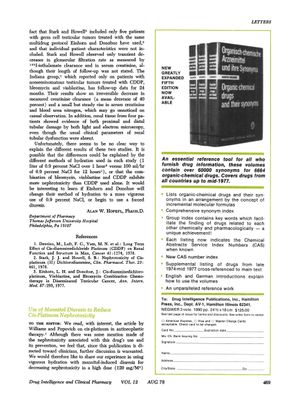Use of Mannitol Diuresis to Reduce Cisplatin Nephrotoxicity
August 1978
in “
Dicp-The annals of pharmacotherapy
”
mannitol diuresis cis-platinum nephrotoxicity testicular carcinoma prehydration fluid replacement diuresis renal toxicity BUN serum creatinine creatinine clearance electrolyte replacement mannitol cisplatin kidney toxicity testicular cancer hydration fluid therapy urine production kidney damage blood urea nitrogen creatinine kidney function electrolyte balance

TLDR Mannitol diuresis allows higher doses of cis-platinum for testicular cancer treatment without increasing kidney damage.
The document discusses the use of mannitol diuresis to reduce nephrotoxicity caused by high doses of cis-platinum (120 mg/M²) in the treatment of testicular carcinoma. The authors describe a procedure that includes prehydration, administration of mannitol prior to cis-platinum, and a mannitol drip followed by fluid replacement to induce diuresis. This technique aims to allow higher doses of cis-platinum to be administered without significantly increasing renal toxicity. The authors report that this method has been effective in increasing the therapeutic efficacy of the treatment regimen for testicular carcinoma. Supporting details include the use of experimental animal models, baseline data collection on patients' health status, and the monitoring of toxicity through various tests such as CBC, platelets, BUN, serum creatinine, creatinine clearance, and audiograms. The document also mentions the severe vomiting induced by cis-platinum and the importance of fluid and electrolyte replacement during this period. The authors conclude that mannitol diuresis has had a profound effect on permitting higher doses of cis-platinum for testicular carcinoma treatment without enhancing renal toxicity.


